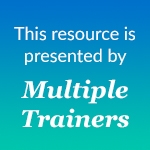

NVC Resources on Requests
-
Before you make a request you can connect fully to a time when your need was met. Notice how your request feels and sounds different from this place of aliveness. Excitement about meeting a need implies confidence and trust about moving forward together. Offer an invitation to find strategies that work for both of you.
-
Learn three tips to handle distractions from a group’s purpose, like long empathy requests.
-
Here are two practices for connecting with "request energy". One of them helps us practice in the moment (7 steps). The other one helps us connect to ourselves (11 steps).
-
See the 4 NVC steps reframed in everyday workplace language.
-
Learn when to use the two types of requests in the practice of Nonviolent Communication: Action Requests and Connection Requests. Both are important when working through conflict or difficult situations and for building connection.
-
Jim and Jori Manske share the wisdom of Marshall Rosenberg, the founder of Nonviolent Communication (NVC). Join them to learn why knowing what you want before speaking is essential for clear, meaningful interactions. This snippet from their eight session course, 9 Skills for Navigating Conflict, explores how to make "confirmation requests" to ensure you're understood—whether you're navigating a tough conversation or simply ordering pizza!
-
In this enlightening Trainer Conversation, three veteran CNVC Certified Trainers discuss whether NVC can be learned without first learning Observations, Feelings, Needs, Requests (OFNR). The conversation naturally meanders as the trainers grapple with the question, eventually covering a wide-range of topics including the spirituality and true essence of NVC.
-
Mediating a conflict conversation can be challenging – but with tools and practice, that challenge can be transformed. If you're curious about the specific steps needed to achieve that transformation, join John for an exploration of his non-dual mindfulness practice.
-
Observation is the awareness of our sensory perceptions and thoughts, separate from evaluations and judgments. Feeling involves bodily sensations and emotions, distinct from "faux feelings" that mix thought and emotion. Needs encompass universal human requirements for survival and wellness, while thoughts and evaluations express needs. Requests are rooted in connection and invite true willingness, rather than demanding compliance.
-
Marshall Rosenberg suggests that there are two requests that are the most transformative to relationships, (1) What’s alive in both of us? and (2) What would make life more wonderful for both of us? This telecourse recording offers an easy-to-digest overview of how carefully crafted requests inspire joyful relationships.

Quick Links
Subscription Preferences
Stay In Touch!
Looking for ways to keep up with NVC Academy news, get special offers, free resources, or words of inspiration? Here are five ways to stay engaged:









